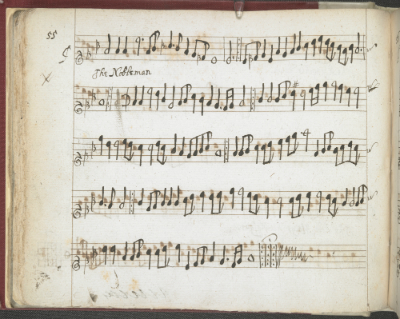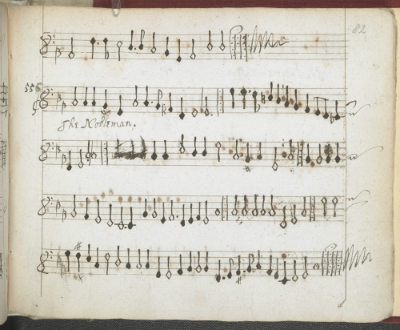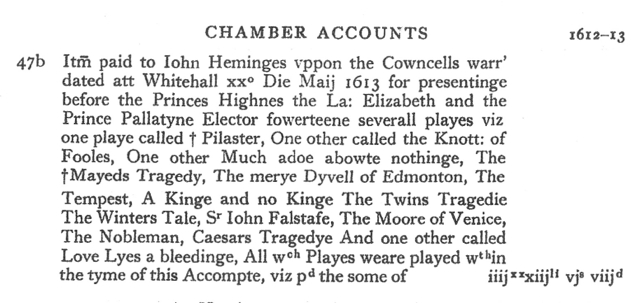Nobleman, The
Historical Records
Stationers' Register
15 February 1611 [i.e. 1612] (S.R.I, 3.478 (CLIO)
Edward Blunte Entred for his Copy vnder th'[h]andes of Sir GEORGE BUC[KE] and Th'wardens, A Play booke being a Tragecomedye called, The Noble man written by CYRILL TOURNEUR . . . . . . vjd
09 September 1653 (S.R.II, 1.429 CLIO)
- Master Mosely Entred also . . . the severall playes following . . xxs vjd
- ...
- The Nobleman or Great man, by Cyrill Tourneur.
Revels Accounts
To John Heminges for himselfe and his fellowes upon a Warrant dated 1 June 1612 for presenting vj severall Playes before his Maty viz one upon the laste of October one upon the first of November one on the 5th of Novr one on the 26th Decr one on the 5th of January and one other upon Shrovesunday at night being the 23rd of February viz at twenty nobles for every play and five markes for a Reward for every play ... ... ... lxli. (Cunningham, Revels at Court, xl-xli)
Accounts of the Treasurer of the Chamber
Item 47b (Cook 55-6):
Item paid to Iohn Heminges vppon the Cowncells warrant dated att Whitehall xx0 Die Maij 1613 for presentinge before the Princes Highnes the Lady Elizabeth and the Prince Pallaytne Elector fowerteene severall playes viz one playe called ‡ Pilaster, One other called the Knott: of Fooles, One other Much adoe abowte nothinge, The ‡ Mayeds Tragedy, The merye Dyvell of Edmonton, The Tempest, A Kinge and no Kinge The Twins Tragedie The Winters Tale, Sr Iohn Falstafe, The Moore of Venice, The Nobleman, Caesars Tragedye And one other called Love Lyes a bleedinge, All wch Playes weare played wthin the tyme of this Accompte, viz pd the some of . . . . . . iiijxxxiijli vjs viiijd
Music, BL Add. MS 10444 (c.1624)
Music for a play, called "The Nobleman", appears in British Library Add. MS 10444, no.55, transcribed by Nicholas L'Estrange:

|

|
| BL Add. MS 10444, fo.55v. | BL Add. MS 10444, fo.82r. |
British Library Add. MS. 10444, reproduced with permission
Wiggins (#1643) notes that further music headed "The Nobleman" was included in a lute-book (BL Add. MS 38539, fo. 19r, from c.1613-16; and in a MS lute-book now lost (Königsberg, Staats- und Universitätsbibliothek, MS S.S.25, fos. 11v-12r).
King's Men repertory list (1641)
On 7 August 1641, the Earl of Essex (now Lord Chamberlain) required the Stationers' Company to forbid the printing of King's Men plays without the company's consent (the desire to protect their plays having been occasioned by the onset of plague and the consequent closure of the theatres from 5 August til the end of November 1641) (Bentley 1.65).
The list of plays specified includes "The Nobleman."
(See the list in full here)
Warburton's list
"The Nobleman T.C. Cyrill Turnuer" appears as one of the last plays noted by John Warburton (1682-1759) in his list of the unprinted MS plays allegedly in his collection until destroyed by Warburton’s cook (Greg, "The Bakings of Betsy" 231):
- The Tragd. of Jobe Good
- The Nobleman T.C. Cyrill Turnuer
- A Play by Will Shakespear
- Bugbear C. Jon. Geffrey
- Orpheus C.
- Tis Good Sleeping in A Whole Skin W. Wager
- Farry (sic) Queen
See the full list from British Library Lansdowne MS. 807 here.
Theatrical Provenance
The play was performed at Whitehall by the King's Men on 23 February 1612, and was one of 20 performed by the King’s Men at court through the winter holiday season of 1612-13 (Chambers 3.500). It was a bittersweet time for the court. Prince Henry died suddenly of a fever on 6 November 1612, yet the marriage of Princess Elizabeth to the Elector Palatine took place as scheduled on Valentine’s Day, 1613.
Probable Genre(s)
<List possible genres of the play: if noted by a critic, cite them, e.g. "Comedy (Harbage)". If an original speculation, simply list the genre.>
Possible Narrative and Dramatic Sources or Analogues
<Enter any information about possible or known sources. Summarise these sources where practical/possible, or provide an excerpt from another scholar's discussion of the subject if available.>
References to the Play
<List any known or conjectured references to the lost play here.>
Critical Commentary
<Summarise any critical commentary that may have been published by scholars. Please maintain an objective tone!>
For What It's Worth
W. C. Hazlitt notes in his A Manual for the Collector and Amateur of Old English Plays (1892), p.167: "Dr Furnivall told me many years ago that the MS. was in the hands of a gentleman at Oxford, who was editing Tourneur's Works; but I have heard nothing further of it" (Internet Archive). The MS has not been traced subsequently.
Works Cited
<List all texts cited throughout the entry, except those staple texts whose full bibliographical details have been provided in the masterlist of Works Cited found on the sidebar menu. Use the coding below to format the list>
<If you haven't done so already, also add here any key words that will help categorise this play. Use the following format, repeating as necessary:>
Site created and maintained by your name, affiliation; updated DD Month YYYY.
